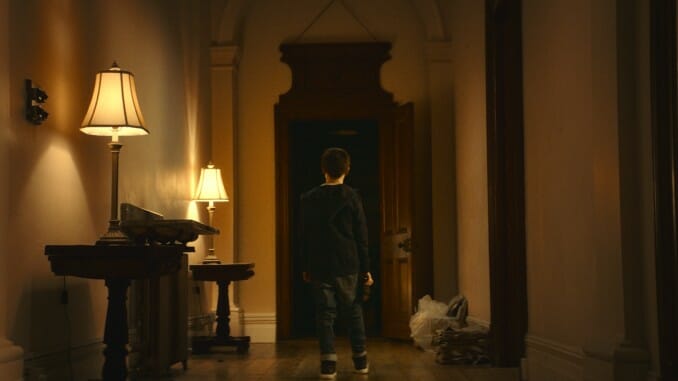Devilishly Dull Horror The Cellar Expands Short Film in All the Wrong Ways

Irish director Brendan Muldowney’s The Cellar is an expansion of a project he completed nearly 20 years ago. Based off of his 2004 short film The Ten Steps, Muldowney’s latest expands the Satanic parameters of the movie’s plot, which unfortunately dulls much of the dread inherent in the original short. Incorporating a slew of plotlines—demons, Jewish folklore and a police investigation among them—The Cellar is erratic and unfocused, entirely unsure of the story it wishes to tell. Aside from the one chilling scene grafted straight from The Ten Steps and its gorgeous, historic filming location, The Cellar just isn’t that deep.
The story begins where so many classic horror movies do: A family moves into a huge, historic house and creepiness immediately ensues. Mom (Elisha Cuthbert) and Dad (Eoin Macken) couldn’t be happier with their antiquated new abode, finding infinite charm in the worn-down floorboards and enormous reading room. Their eldest daughter Ellie (Abby Fitz), conversely, thinks the house is an unparalleled eyesore, one that no amount of teen-appropriate room décor can even begin to alleviate. Her younger brother Steven (Dylan Fitzmaurice-Brady) approaches his new surroundings with predictable childlike curiosity, finding the old phonograph in the living room particularly intriguing. Yet one room inspires abject dread as opposed to nostalgic mystique: The cellar.
Mere moments after stepping foot into their new home, Ellie cautiously peers into the basement, only to have the door shut behind her before the rest of her family can follow. She frantically paws at the doorknob, which has locked solidly in place. Even with the voices of her parents reassuring her from the other side of the door, she begins to feel a presence slowly inching toward her up the pitch-black stairs. After the family realizes a key hangs directly above the door frame, Ellie is quickly freed. Though she’s clearly traumatized by the incident, her parents brush it off as the cruel trick of a finicky old lock. A few days later, however, Ellie calls her mother at work to let her know the house’s power went dead. When instructed to go into the basement and check the circuit breaker, Ellie immediately tenses up and refuses. Her mother gets her to agree by promising to stay on the phone the entire time, guiding Ellie by having her count the ten steps down the stairs in the darkness. Oddly, though, Ellie keeps counting well past the tenth step. She gets well past twenty before her mother ditches the office and races home. When she gets there, however, there’s no trace of Ellie.
-

-

-

-

-

-

-

-

-

-

-

-

-

-

-

-

-

-

-

-

-

-

-

-

-

-

-

-

-

-

-

-

-

-

-

-

-

-

-

-








































